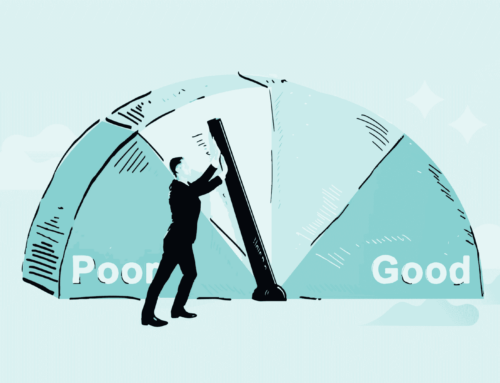When applying for a credit card or loan, the application process can feel lengthy, and waiting for approval can seem like forever. When you finally hear back from your lender and it turns out you were rejected for a credit card and loan, it isn’t the best feeling in the world. Especially in an emergency situation where you need quick approval.
In short, being denied credit isn’t what affects your score. Generally, If you apply for credit, regardless of the outcome, your credit score will be affected. So, if you apply five times for credit and are approved, each time, your credit score will decrease. You can lose a few points on your credit score for even just applying for credit. Let’s learn more.
What’s the Difference Between a Hard Inquiry VS a Soft Inquiry?
The reason your score drops when you apply for a card is that lenders generally do a hard inquiry to check your credit before approving or rejecting. When applying for credit, there’s a huge difference between a hard inquiry and a soft inquiry.
A hard inquiry is performed by a lender or creditor with whom you applied for credit. They review your credit profile as part of their decision-making process. The credit bureaus (TransUnion or Equifax) note this information, recording the date and the name of the company or entity accessing your information. When this type of inquiry is performed, it will appear on your credit report and can impact your credit score. A credit card company, a bank, or a car leasing company may perform a hard inquiring before approving you for a product you applied for.
A soft inquiry or “soft pull” is generally performed by you, a person checking their own credit. This can also be checked by a lender or credit card company for preapproval, or an employer checking your credit as part of a background check. A soft inquiry does not impact your credit score.
There’s a big difference between hard inquiry vs a soft inquiry. Whereas a soft inquiry may seem more attractive since it doesn’t affect your score, you can’t be fully approved for credit without performing a hard inquiry. This is a part of the risk assessment process from creditors to see if you’re a reliable candidate for credit approval.
Why Does Making an Inquiry Affect Your Credit Score?
So, as we mentioned, a hard inquiry is essential when applying for a credit or loan product. This allows the lender to pull your credit report and risk assess your profile, acquiring all the information necessary to make an informed decision on whether to provide you with a credit or not. Whereas there are many factors that make up your credit score, one is how often or recently you’ve applied for credit.
Hard inquiries make up about 10% of your credit score. Even though it’s only a small percentage of your score, it still impacts it and should be something you’re cautious of. A creditor will look at someone’s credit report, with multiple hard inquiries, as someone who may be desperately chasing credit approval. This may then lead them to the conclusion that you’re someone who may not be in good financial standing and may not be a reliable contender for further credit approval.
Does Denied Credit Show Up on Your Credit Report?
The short answer is no, being denied credit does not show up on your credit report. To compare, being approved for credit does not show up on your credit report either. Regardless if you’re approved or denied, your credit report will not detail the exact outcome of the hard inquiry.
A hard inquiry is not necessarily a bad thing. It’s good that everyone who checks your credit report is recorded. But it’s reported that a hard inquiry can impact your score from anything between 5-25 points. This all depends on what your credit score is already.
How Do I Minimize The Impacts Of A Hard Inquiry?
Whereas you can’t minimize the impacts of a hard inquiry, you can certainly ensure that they aren’t performed in the first place. There isn’t a set number of inquiries that are ever “too many”, but if you have a numerous amount performed in a short space of time, it can look bad to your potential creditors.
The first way to avoid the impact of a hard pull is to avoid applying for credit. But that can be extremely difficult not to do. But there are other steps you can take to avoid the negative effects. Let’s learn more!
Do your research before applying for credit
Before applying for credit, it’s important to shop around. But make sure you research the acceptance criteria, alongside creditor’s terms and conditions before officially submitting your application.
Sometimes, we may submit numerous applications in the hope at least one will be approved. But each creditor will pull our credit report each time we apply, which will impact your score. Try to submit applications one by one to credit cards or loan products that you know are the best rates. This means if you’re approved, these will be the ones you will definitely go ahead with.
Keep track of your credit report
You only know if inquiries are impacting your credit if you’re monitoring your report and score. Make sure to check your credit regularly. It’s important to understand where you stand and whether there are any potential mistakes bringing your score down.
Don’t apply if you feel you’ll be rejected
Don’t just apply for a credit card or loan, even if you know you’re going to be rejected. It’s best to only apply for the product you know you may have a chance of being approved for. It’s not always obvious if you’re going to be rejected. Creditors may have some other unique criteria they use for approval, but give it your best shot.
Boost your credit score
Before shopping around or even considering applying for a credit or loan product, try to boost your credit score first. Your credit score is a quick snapshot of how financially responsible you are. Lenders will use this when considering your approval. If your credit score is already excellent, you will ease any worry of rejection and eliminate the need for multiple applications upon rejection. To learn how to boost your credit score, check out MyMarble Premium here.
Conclusion
So as we learned, when applying for credit the denial or approval is not what affects your credit score. It’s the application process that will impact your score. Let’s make sure to do our research, limit applying multiple times and keep track of our credit report before and after applying for a loan or credit. This will help us beware of the impacts it may have on our bottom line.






